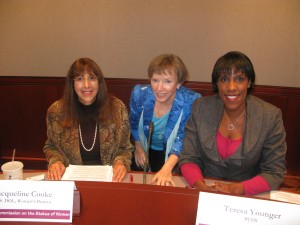Labor activists are seeking new protections for domestic workers, who, they say, have historically been left out of any labor movement.
Housekeepers, caregivers and domestic workers are often subject to low wages and are at risk of sexual abuse. Yet they have few legal protections, said Meghan Vesel, deputy director of the Connecticut Brazilian Immigrant Center.
“Culturally, all across the world, domestic workers aren”™t given much dignity or respect,” Vesel said. “But we”™re trying to transform how people look at the work they do. We believe domestic workers take care of America. They power the economy by allowing people to go out and make their living.”

Unless housekeepers work 15 hours a week for the same employer every week, minimum wage laws are practically unenforceable, Vesel said. And if nannies are sexually harassed by an employer, they won”™t be able to sue unless the employer has a certain amount of employees, she added.
As a result, activists are pushing to create a domestic worker”™s bill of rights to be introduced to the Connecticut Legislature in January.
“These are people who are usually working behind closed doors,” Vesel said. “We”™re trying to give them visibility and put a human face on the issue.”
Currently the Connecticut Brazilian Immigrant Center is leading the movement, basing its bill of rights on a similar one in Massachusetts. Legislation with new protections for domestic workers has also recently passed in New York and Hawaii.
To explore the issue of domestic workers”™ rights, the Connecticut Department of Labor and Permanent Commission on the Status of Women (PCSW) hosted its first in a series of policy roundtable discussions late last month.
With the number of service workers growing in Connecticut, PCSW President Teresa C. Younger said the commission was in the process of identifying domestic workers”™ top concerns and possible solutions. At this time, Younger said the commission has not endorsed a domestic workers”™ bill of rights, though it may support legislation in the future.
“Because they”™re isolation, workers don”™t know what they”™re rights are and that they do have rights that protect them,” Younger said.
Younger said some of the top concerns indentified so far included problems with low wages and consistently being paid. They can lodge complaints at the Labor Department and Occupational Safety and Health Administration, Younger said. And some community support centers can help workers understand their rights and file a complaint. Sometimes these centers can also help workers”™ negotiate with their employers if there is a language barrier or help them find a new employer, Younger said.
Overall, further awareness of current workers”™ rights is needed, she said. The commission plans to continue the roundtables into the next year.
“We need to be aware of what”™s going on behind closed doors and in our communities,” Younger said.



















I was honored to participate in this crucial matter for home care workers. (That’s me in the center.) The experts explored many aspects of the abuse of these, primarily, women. Much of my testimony focused on wage and benefit protections. Griswold pays hourly workers $12.45/hr plus workers’ comp, unemployment, bonding and professional liability (The last two create more jobs). Most CT Registries do not provide workers’ comp or unemployment. For 24 hour live-in care, our caregivers earn $44,000 plus room and board with one full month off a year (or they can elect more time off).
We strongly support the minimum wage act enforcement but have reservations about the time-and-a-half for live-in care provided by a reputable agency such as ours. The advantages to hiring agency caregivers are strict screening, oversight and seamless coverage. No one, when providing live-in care, works 24 hours a day! 8 hours of sleep and 2 hours off is built into the schedule. If the new Fair Labor Standards Act, going into effect in 2015, is not changed, a single caregiver is to be paid $102,000 at our rates. Common sense says that families cannot afford that increase. Instead, 5 caregivers will have under 40hour weeks, 4 will earn $17,680 each and 1 will earn $3500. The lack of continuity of care will be severe, as will the challenges to seamless. coverage. Overall, the change in this aspect of care will drive the caregivers underground. Neither family nor the caregivers will receive the protections that an agency provides and both will suffer.
We support all aspects of the law but urge that caregivers with shifts of 12 hours or more, that allow the caregiver to sleep 8 hours, be exempted from the time-and-a-half rule for more than 40 hours a week. We have our caregivers full support in this manner. All of them want the opportunity to work these longer shifts for good pay.